rhaa [řàá] vb. to steal: Iran rhaa gbe
vbe ẹvbo na ― “They steal exceedingly
in this town (i.e. there is a lot of
stealing in this town.)”

rhaan [řã̀ã́] vb. 1. to loosen; to untie:
Rhan irri nii hin ẹnrẹn owẹ rre ―
“Loosen that rope from its leg.”; 2.
(with aro) to open.

rhaanro [řã̀ã́rò] vb. (< rhaan ― vbe ―
arọ) “open at the eyes”: to be so-
phisticated; to be civilized. (cf.
ìrhànrò).

rhanmwẹn [řã̀ɱɛ̃́] vb. 1. to dip (a
piece of food) into soup or sauce
(before eating it) (e.g. eba or pounded
yam).; 2. to touch, to come into
contact with: Ukpọn ne ọ rhuaẹn
rhanmwẹn otọ ― “The cloth she is
tying touches the ground.”; 3. (idiom)
to be affected severely: Obọ rhanmwẹn
ọnrẹn vbe ugbemwẹn ne iran gbẹe ―
“He really had it from the beating
that they gave him.”
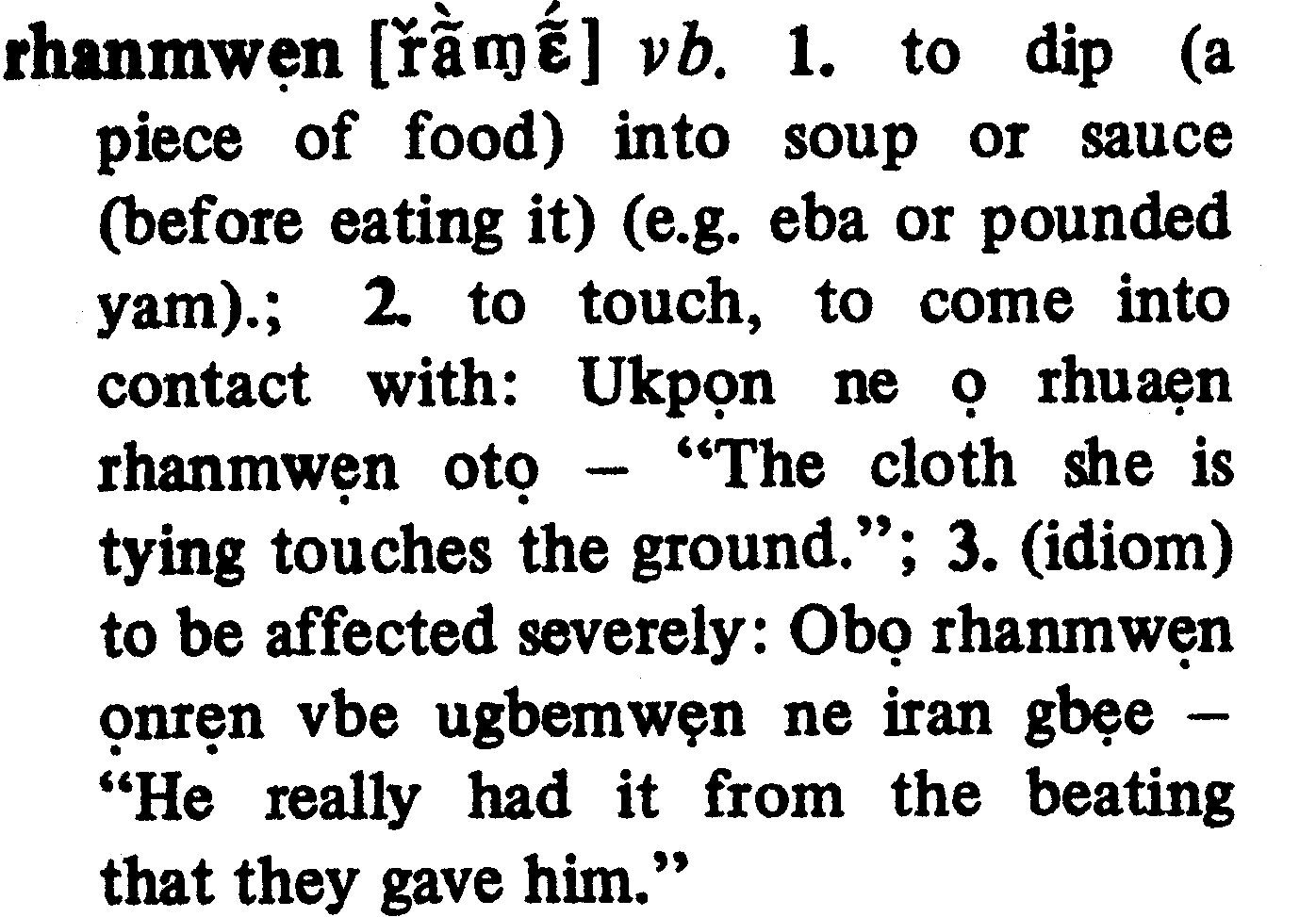
rhanmwẹn [řã́ɱɛ̃̀] adv. “to the extent
that”; “so much so” (usually occurs
in a negative clause): Ei rhulẹ rhanmwẹn
ne obọ ghẹ vba ọre ― “He cannot
run so much (so fast) that he would
not be caught.”
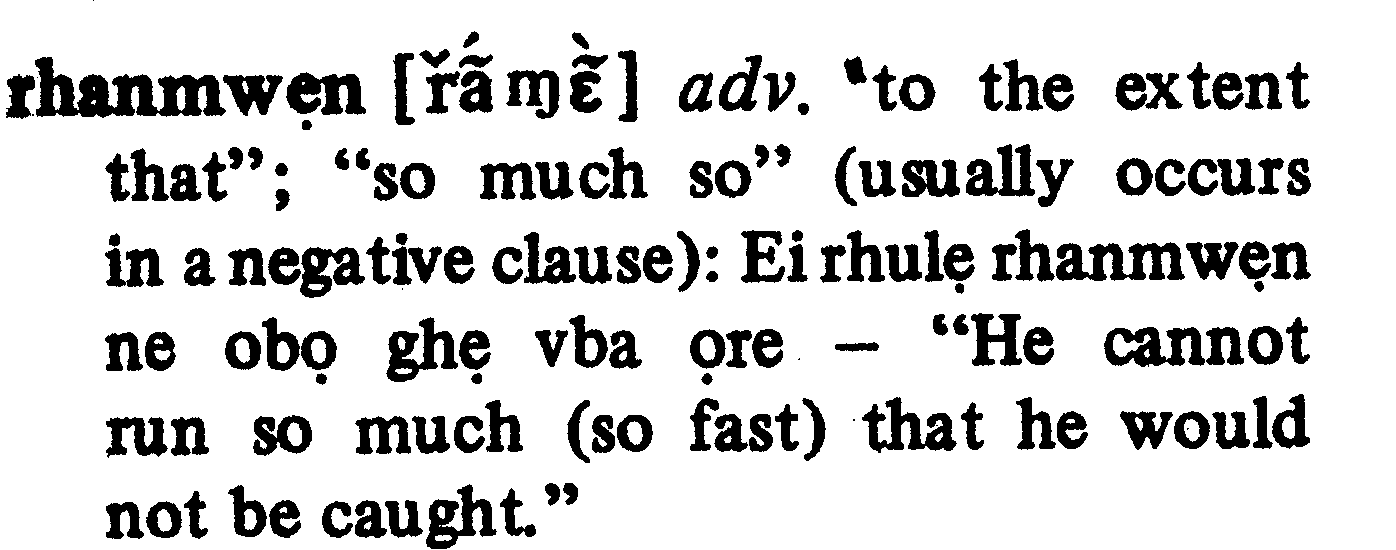
rhanrhananrhan [řã́řã́ã́řã́] adv. very
loudly: Ọ vaẹn rhanrhananrhan ― “He
%%

shouted very loudly.”

rhee [řèé] adv. even though; though:
Ọ rhee yẹ mwẹn, sokpan ii khian
sẹtin dọe ― “Even though I like it,
I will however be unable to buy it.”

rherhe [řeře] adv. quickly, early, in
good time: Ọ rherhe kpaọ ― “He
left in good time.” U ghi rherhe rre ―
“Arrive early” (As part of the greeting:
U rherhe) “farewell”; “safe-journey”,
etc.
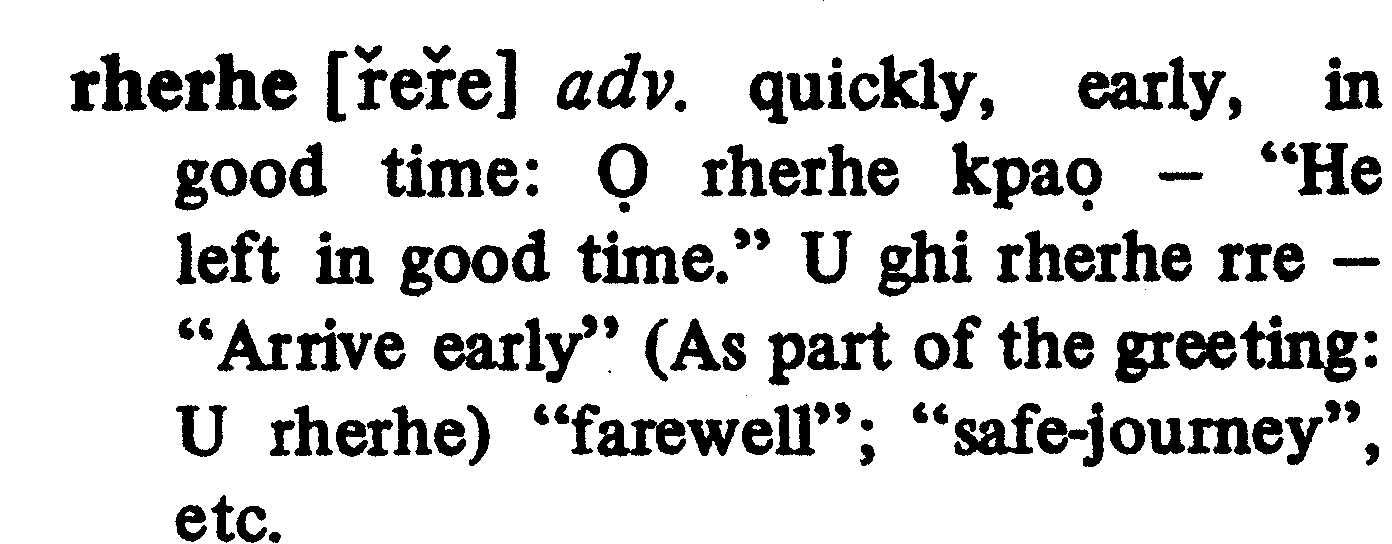
rhia [řyá] vb. 1. to spoil or to become
spoilt; to go bad; to develop a fault:
Ikẹkẹ mwẹn rhiae ― “My bicycle
has developed a fault.” Uwọnmwẹn
na rhiae ― “This soup has gone bad.”

rhia [řìá] adv. wastefully; wrongly: Ọ
lo ígho hia ne a mu nẹẹn rhia ― “He
spent all the money he was given
wastefully.”

rhie [řìé] vb. 1. to take; to acquire
(used generally of a singular obj.
only) Ọ rhie ebe ne ọ ghaa rre evba ―
“He took the book that was there.”;
2. to pick up something: Ọ rhie ẹre
kpaọ gha rrie owa ― “He picked it
up and took it home (with him)”.
Combination with advs. and other
verbs: rhie baa ― “to add”: Ọ rhie
ekherhe baa re ― “He added a little
to it”; rhie-fua ― “to throw away”:
$Page 130$
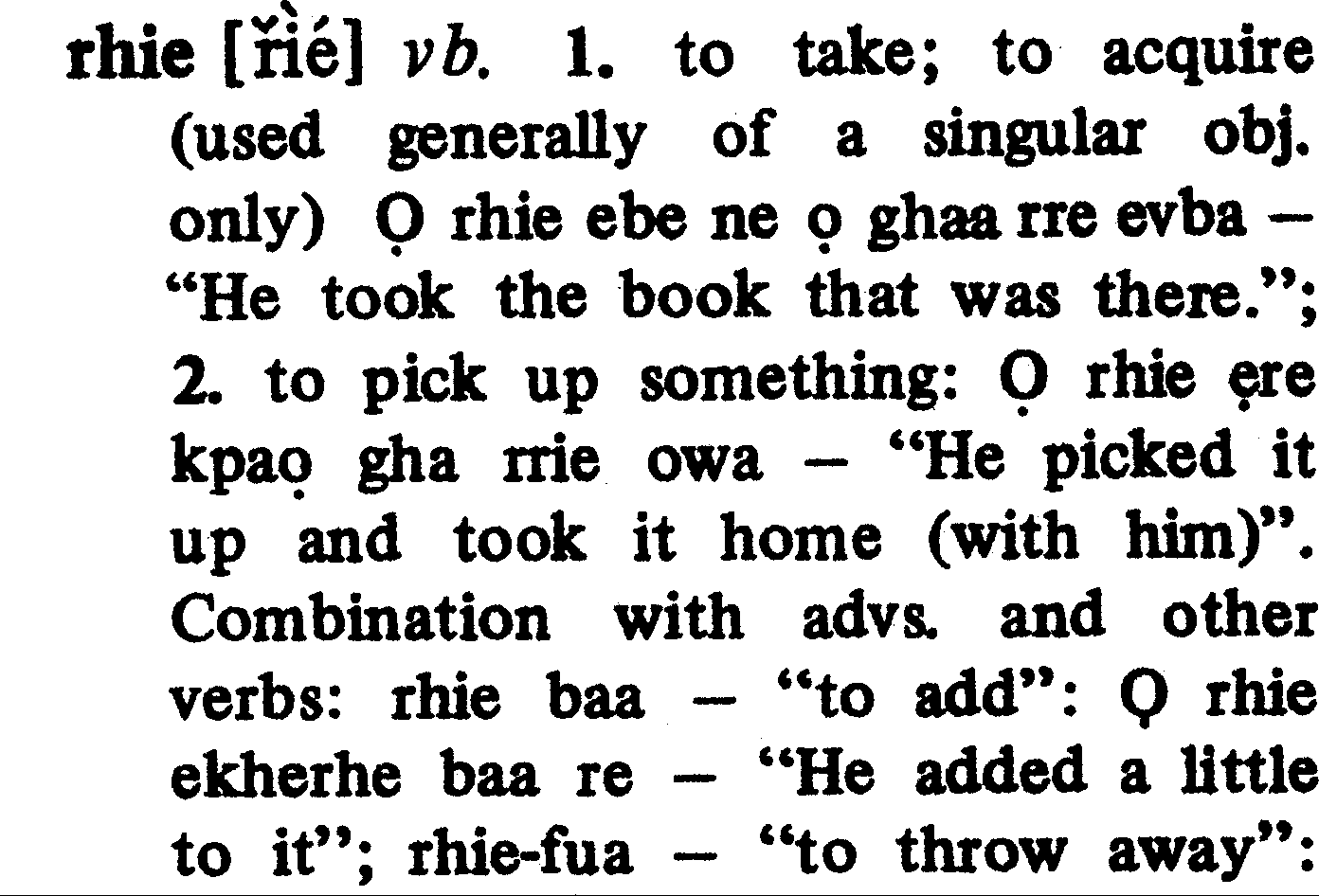
“Ọ rhie enọkẹre fua” ― “He threw
away the other one”: rhie-gbakhua ―
“to save”; “^to put away as standby”:
O rhie ígho kherhe gbakhua khẹẹ ivbi-
ẹre ― “He saved a little amount of
money away for his children.” rhie ―
hin ― 1. “to remove”: Ọ rhie nẹima
ne ọ rrọọ hin vbọ ― “He removed
the bad one out of it”.; 2. to store
away; to keep: Ọ rhie ígho ne iran
rhie nẹẹ hin ― “He kept the money
that they gave him.” rhie ― lẹre ― “to
hide (something)”: Ọ rhie ígho ẹre
lẹre ye uwowa ― “He hid his money
in the house”; rhie maa “to show”;
“to prove to”: Ọ rhie uyinmwẹn
dan rẹn maa vbe evba ― “He de-
monstrated his bad habit there.”
rhie na ― “to give to”; “donate”:
Ọ rhie ígho ne ibiẹka eso ― “He
gave money to some children.” “rhie-
rrọ” ― 1. “to perch”: Ọ rhie rro ye
uhunmwun erhan ― “It perched
on the tree.”; 2. “to hang up” ―
Ọ rhie ẹwu ẹre rrọ ye irri ― “He hung
up his garment on the rope.” rhie
mwẹẹn ― “to hold”: Ọ rhie ẹkpo
mwẹẹn vbe obọ ― “He was holding
a bag in his hand.”; 3. rhie-yi ― “to
place or leave (somewhere)”: Ọ rhie
ígho ye otọ ― “He left money down
(behind)”.
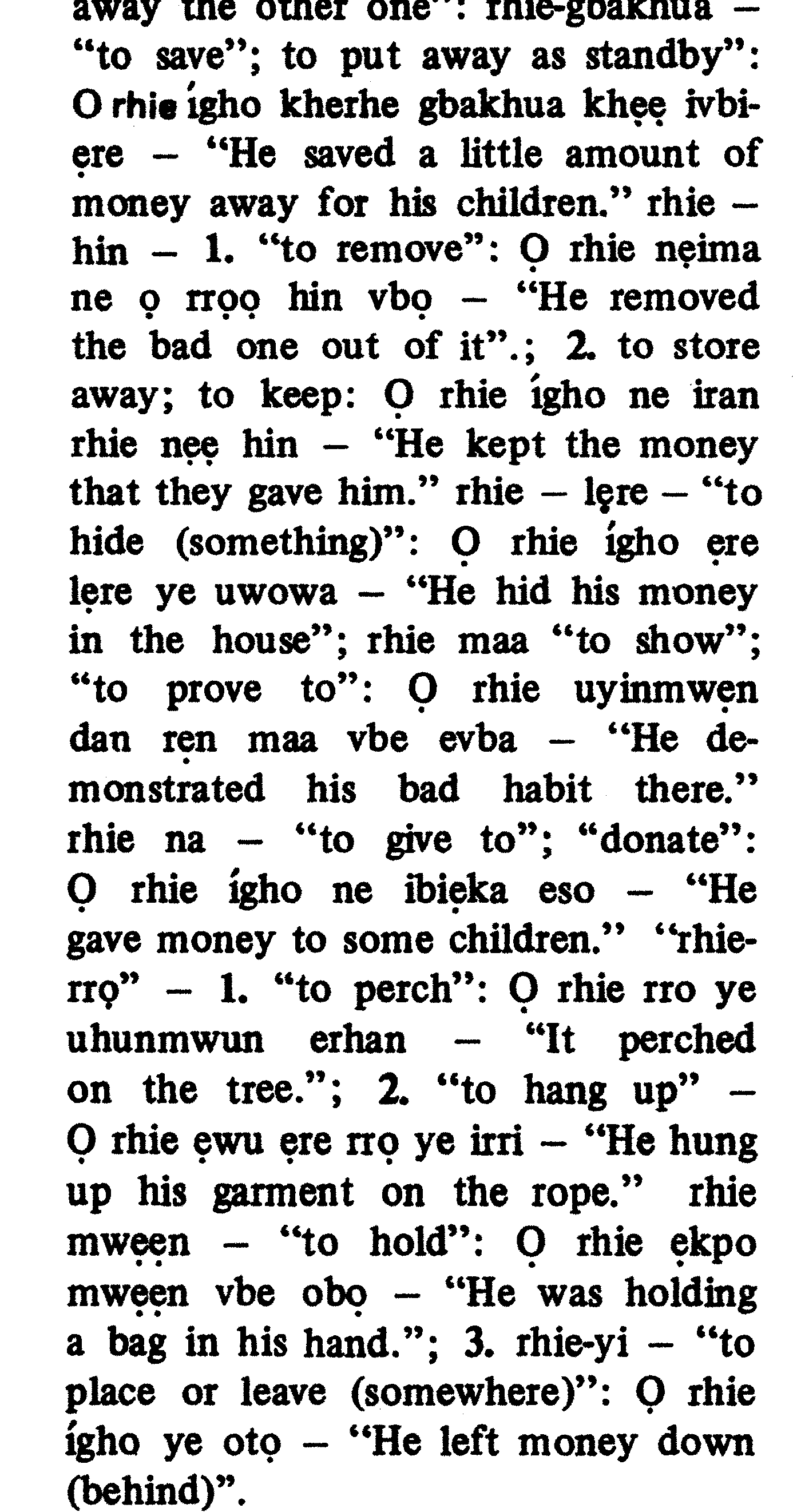
rhiegbe [řyègbé] vb. “^to take self”: to
emancipate from apprenticeship or
wardship.

rhiẹnrhiẹn [řỹɛ̃̀řĩɛ̃́] vb. 1. (of edible
things) to be delicious; to be appetiz-
ing: Evbare na waa rhiẹnrhiẹn ―
“This meal is very delicious”; 2.
(of non-edible things): to be delightful,
pleasant and pleasurable: Eghẹ
emwiunkpo rhiẹnrhiẹn gbe ― “The
new year period is very pleasant.”
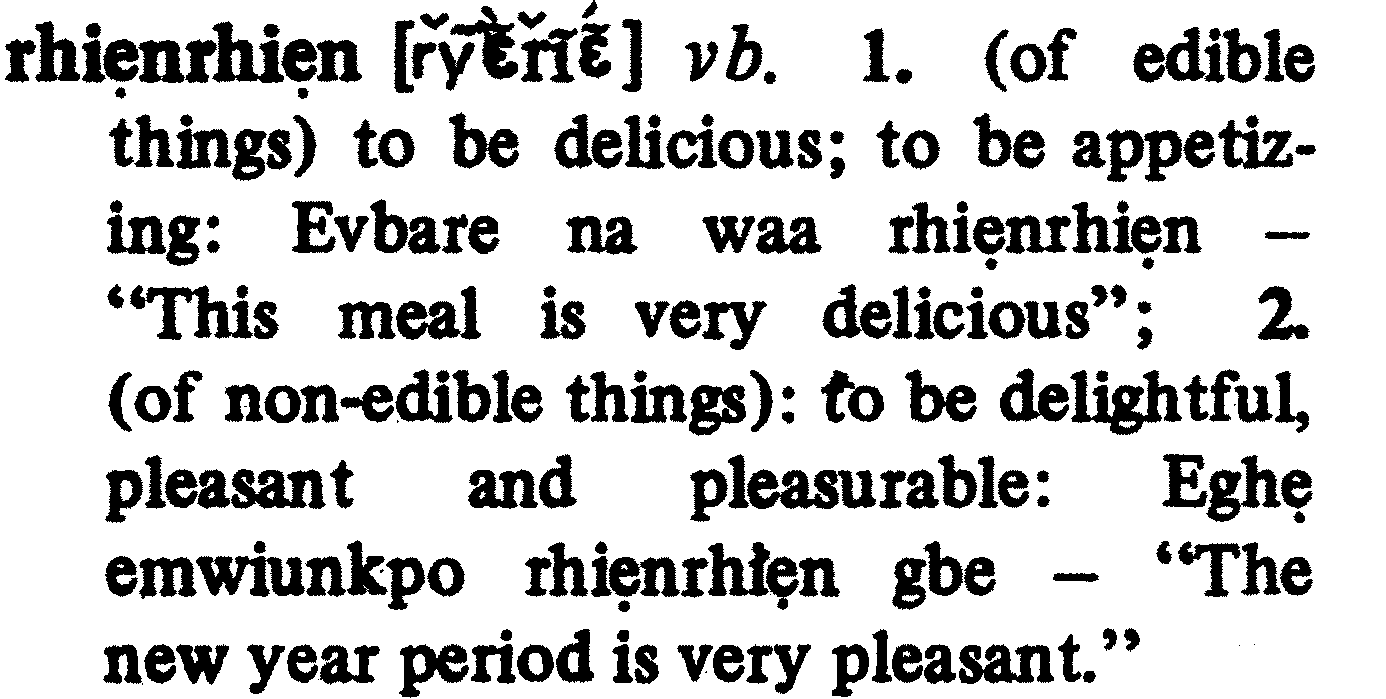
rhikhan [řìxã́] vb. 1^.^ to be smooth, supple
and pliable; (of pounded yam): to
be of smooth consistency; “good-
to-eat.”; 2. to put up a struggle: Ọ
rhikhaẹn lelẹe ― “She struggled after
him”.
%%
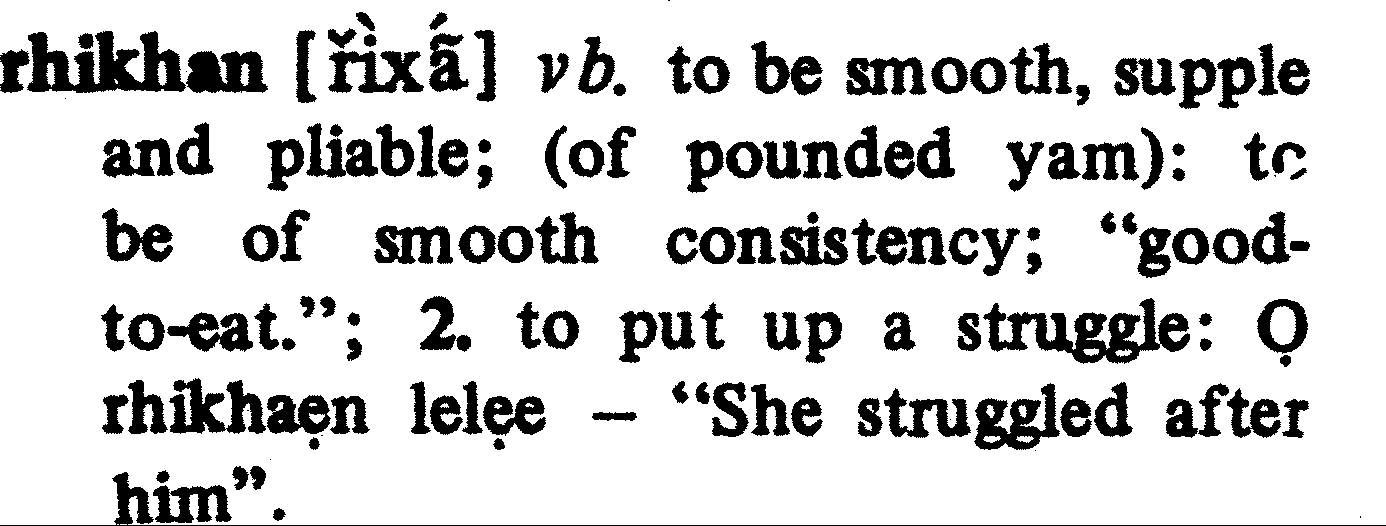
rhinnọ [řĩ̀nɔ̃́] vb. 1. to disturb a wound
through contact with something: Ọ
rhinnọ mwẹn owẹ ― “He hurt the
wound on my leg.”; 2. to rouse painful
memories: Ẹmwẹn ọnrẹn wa vbe
rhinnọ mwẹn orhiọn ― “Thoughts
of him have again roused painful
memories in my mind.”
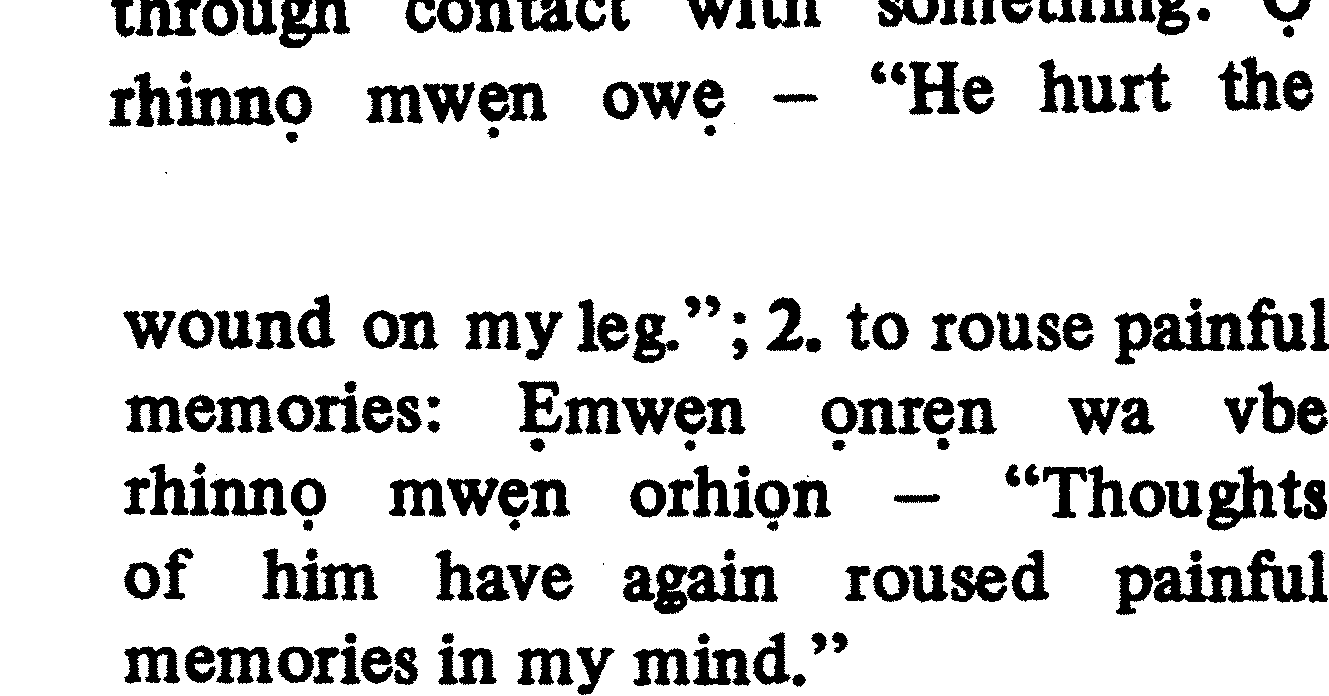
rhinrinrin [řĩr̃ĩ́r̃ĩ́] adv. (of time) con-
tinuously; non-stop. Te iran ye khẹẹ
ọre rhinrinrin do sẹ ẹre na ― “They
are still waiting for him continuously
up to this day.”

rhiobọyebe [řiòbɔ́yèbé] vb. (< rhie-
obọ-ye-ebe): “Put hand on paper” ―
to sign or certify a document.

rhiọ [řyɔ́] vb. to do something very
early in the morning (at the crack of
dawn): Ọ rhiọ khuẹ ne ọ mieke na
rherhe muegbe ― “He bathed at dawn
so that he would be ready in time.”

rhiọha [řyɔ̀há] vb. (< rhie ― ọha) “to
take a bride”: to marry.

rhiọọn [řyɔ̃́ɔ̃́] adv.; adj. indicates ex-
treme state of coldness. Ọ gbonni
rhiọọn ― “It is freezing cold.”; Egbe
ẹre ye rhiọọn ― “Her body is very
cold.”
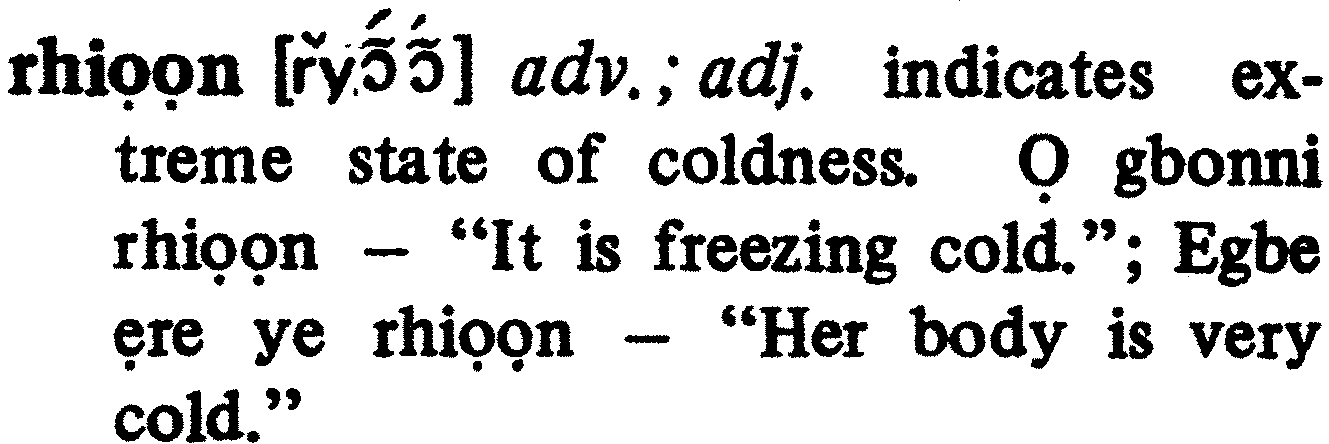
rhiọrre [řyɔ̀ré] vb. to wake up; to rise:
Ọ rherhe rhiọrre nowiẹrẹ ― “He woke
up early this morning.”

rhirhi [říří] adv. expresses the general
adverbial meaning shared by the
following Eng. pronouns: whatever,
whoever, whenever, however: ever:
Eghe nẹ ọ rhirhi khọn ruẹn ― “when-
ever you like”; omwan ne ọ rhirhi
rre ― “whoever comes”; ehe ne u
rhirhi yo . . . “wherever you go”, etc.
$Page 131$
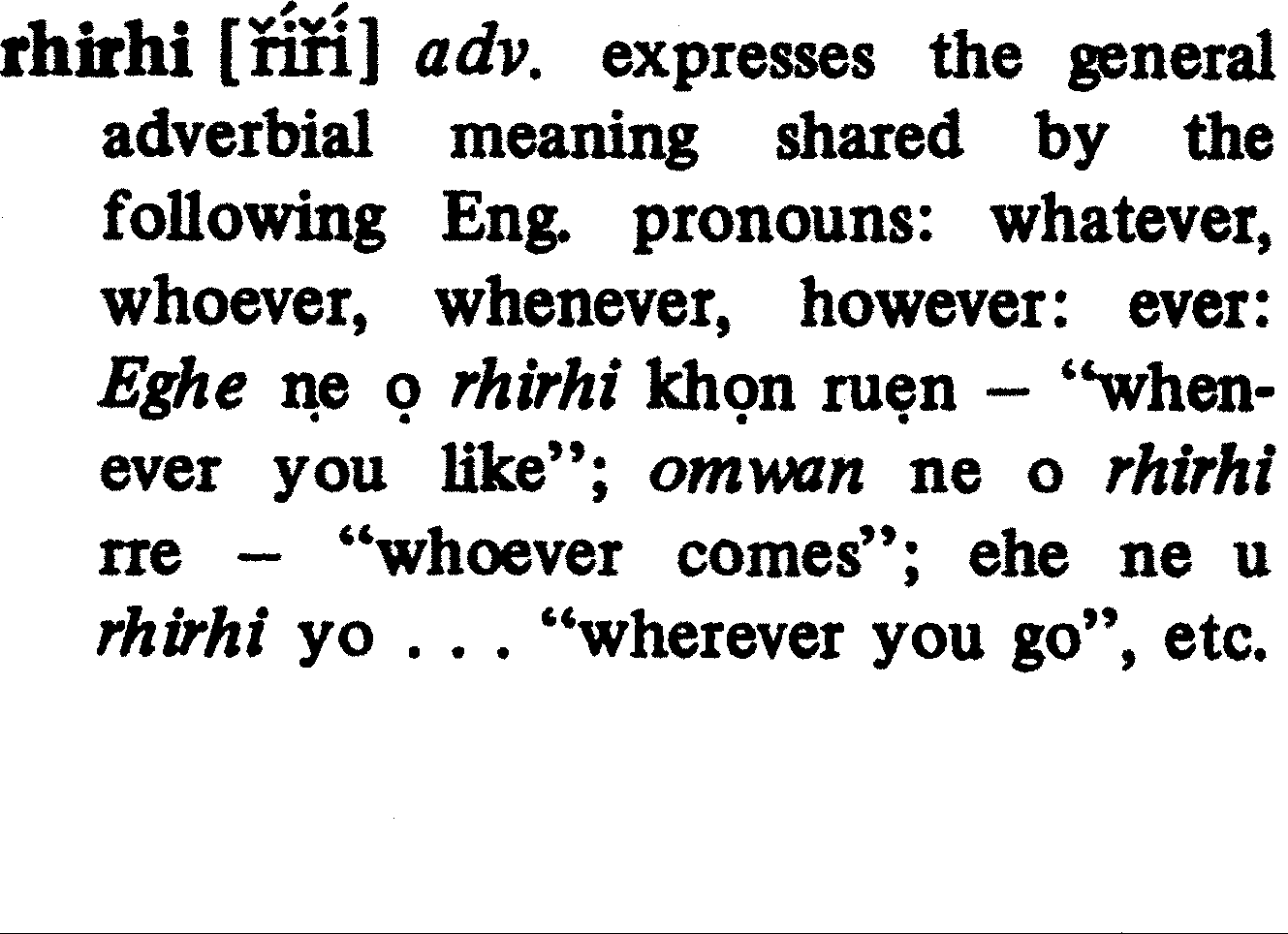
rhiukorrọọ [řìúkórɔ̀ɔ́] vb. (< rhie-
uko-rrọọ) “to hang up the gourd”:
an idiom for “to commit suicide by
hanging”; “to hang.”

rhoo1 [řòó] vb. 1. to praise (esp. in
the religious sense).; 2. to compli-
ment or commend somebody on some
outstanding achievement or good dis-
position.

rhoo2 [řòó] vb.; to commit a breach
of etiquette in reference to the Ọba.

rhovbiẹ [řòvyɛ́] vb. to abuse or insult
verbally: Ne ọ na rhovbiẹ mwẹn ẹre
i na gbẹe ― “On account that he
abused me verbally was why I beat
him.”

rhọkpa [řɔ̀k͡pà] quant. (occurs usually
in neg. clauses). any: emwin rhokpa
rre evba ― “anything is not there:
nothing is there.”^ I ma miẹ ọnwan
rhọkpa vbe evba ― “I did not see
any person there: I saw nobody
there.”
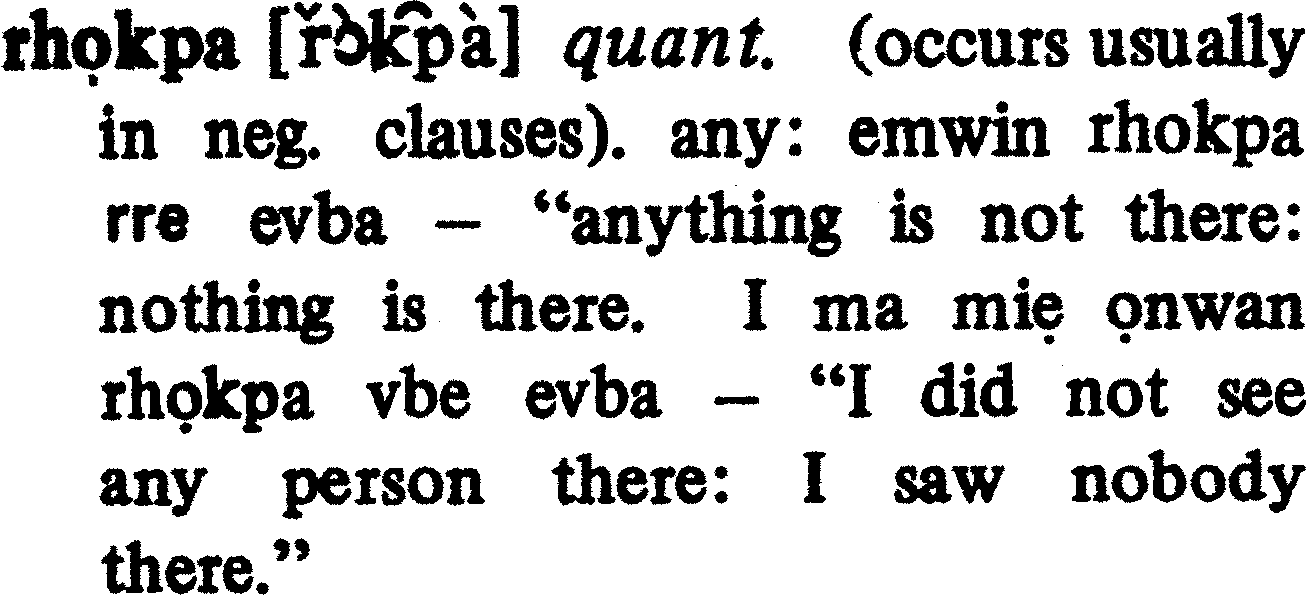
rhọọ1 [řɔ̀ɔ́] vb. to pick up things from
the ground: Ọ gha rhọ alimoi ne i
kharha kua ― “She is picking the
oranges that dropped (down).”

rhọọ2 [řɔ̀ɔ́] vb. to rain: amẹ rhọọre
nodẹ ― “It rained yesterday.”

rhu1 [řú] vb. 1. to cover over some-
thing (e.g. with a larger object): Ọ
si ukpọn rhu aro ― “He pulled the
cloth (to cover) over his face.”; 2.
to cast a shade over (something):
Erhan rhu gue ẹre ― “A tree has
cast a shade over it.”; 3. to wear a
hat: Ọ rhu erhu ― “He wore a hat”.;
4. (of plants) ― to have a full foliage;
to be covered with leaves.; 5. (of
eyes) to be blind: Te aro ọre rhuu ―
%%
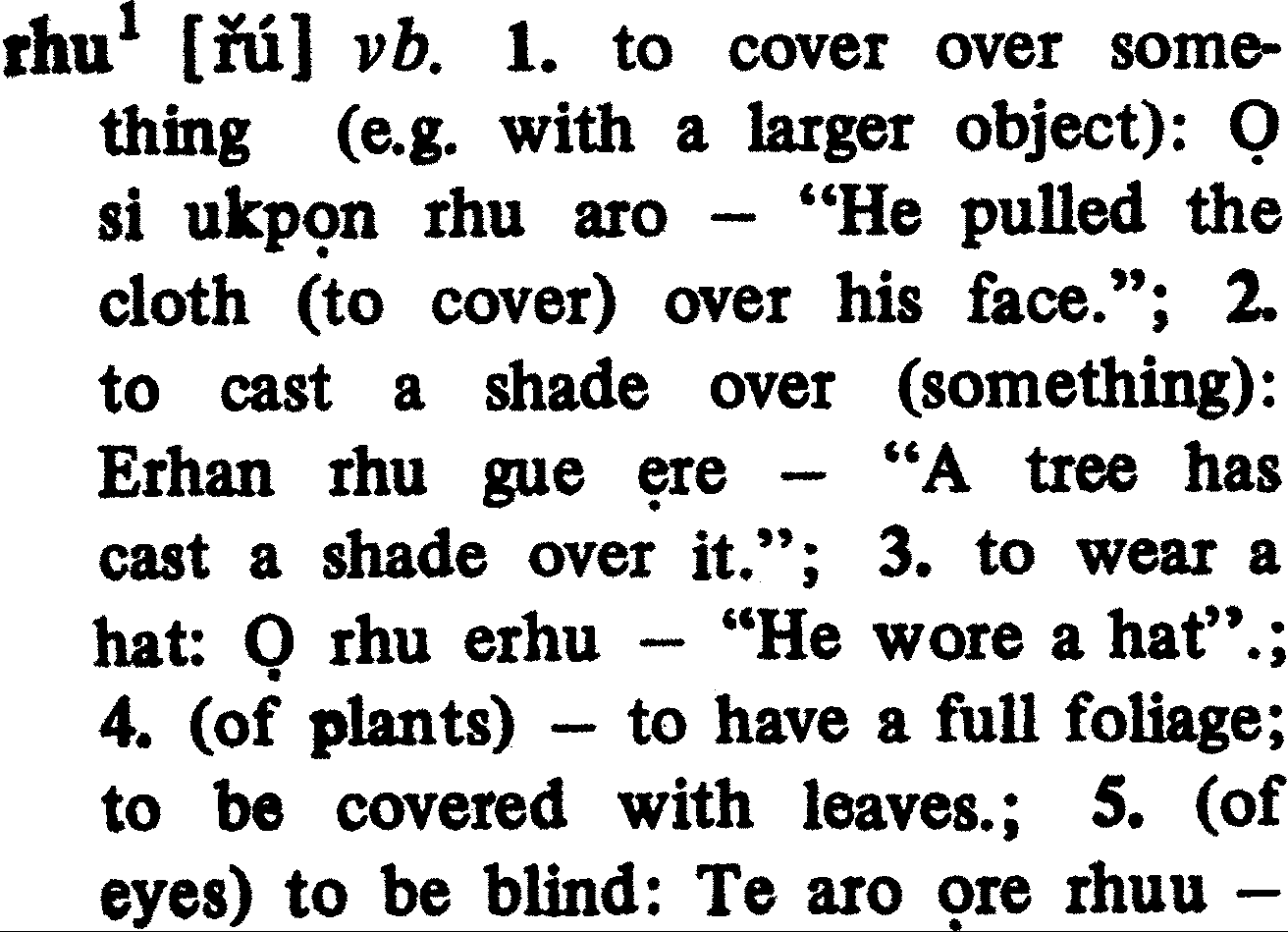
“His eyes are blind.”

rhu2 [řú] vb. to light a lamp or a fire;
to set ablaze: Ọ rhu erhẹn ye owa ―
“He set fire to the house.”

rhua [řùá] vb. to soak (something) in
liquid: Ọ rhua igari ye amẹ ― “She
soaked some garri in water.” (also
rhuarhua).

rhuan [řwã́] vb. 1. to wrap a piece of
cloth around the body; to tie a
wrapper; 2. to dress up (e.g. in full
regalia).

rhuan [řũ̀ã́] vb. to shed skin (e.g. of
snakes); to peel.

rhuarhua1 [řwàřwá] vb. cf. rhua.

rhuarhua2 [řuàřuá] vb. to look fatter
and healthier, esp. after an illness;
to put on a little more flesh esp. by
a lean person.

rhuẹ1 [řùɛ́] vb. to circumcize.

rhuẹ2 [řùɛ́] vb. (of fats and oil): to
coagulate; to congeal.

rhuẹ3 [řùɛ́] vb. (of a trap): to set
a trap. Ọ rhuẹ ifi khẹe ofẹn ― “He
set a trap for the rats.”

rhugbama [řùg͡bàmá] vb. to assemble;
to come together.

rhulẹ [řùlɛ́] vb. (< rhie ― ule) 1. “to
take a race”: to run: Ọ sẹtin rhulẹ ―
“He can run.”; 2. (in combination
with another vb.): to make haste;
to hurry: Ọ rhulẹ ru ẹre ― “He made
haste to do it: he did it hastily.”
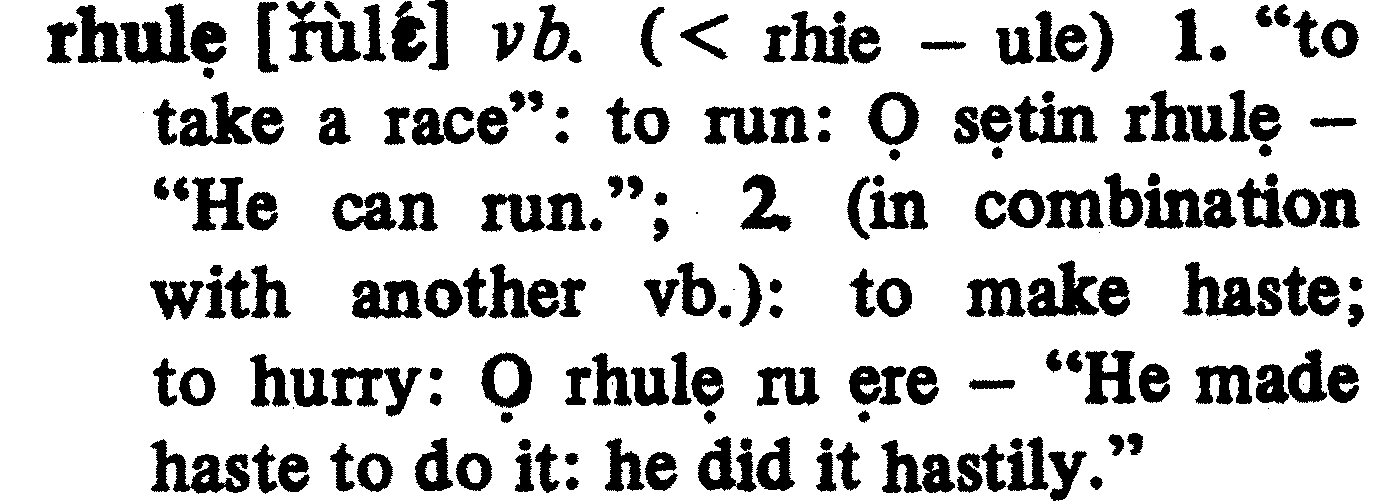
rhunmwunda [řũ̀ɱũ̀dá] adv. because
(of); on account of: Ọ kpaọ rhun-
mwunda emwin ne iran ru ẹre ― “He
left because of what they did to him.”
$Page 132$

rhuo [řùó] vb. to peel off the skin
(used mainly of boiled yam): Ọ rhuo
iyan ye ọre odo ― “He peeled yam
into the mortar for him (to pound)”.

rhuọ [řwɔ́] vb. to boast; to brag.

rhurhẹ [řùřɛ́] vb. 1. to pour away; to
spill: amẹ rhurhẹ kua vbe ọgọ ―
%%

“Water poured out of the bottle.”;
2. to break out with; to develop
(usually of a skin condition): Ikponi
rhurhẹ kuẹ ọre ― “He broke out
into goose-bumps.”

rhurhu [řùřú] vb. to crowd together;
to move in swamps: Iran rhurhu lẹga
ẹre ― “They crowded around it.”
